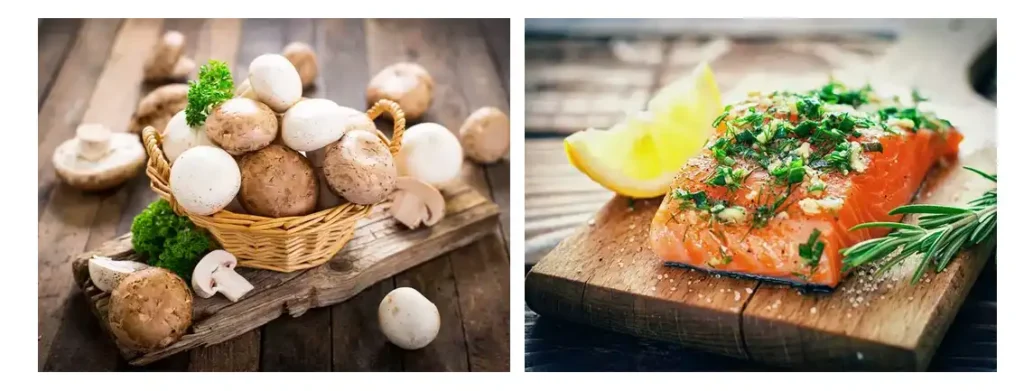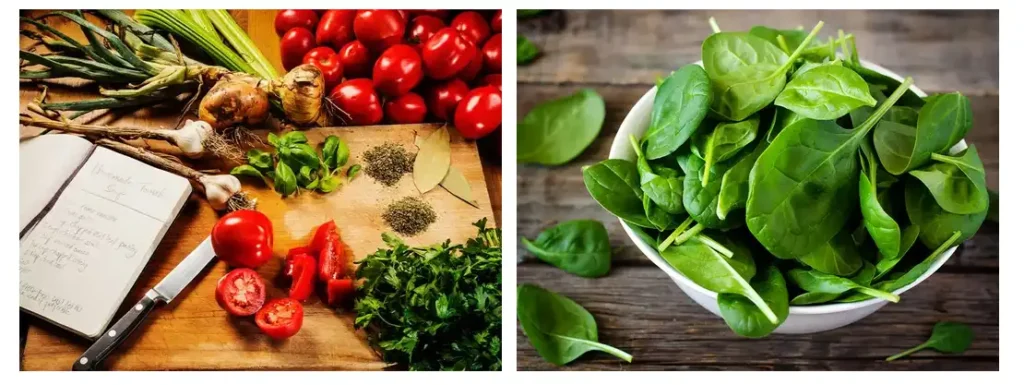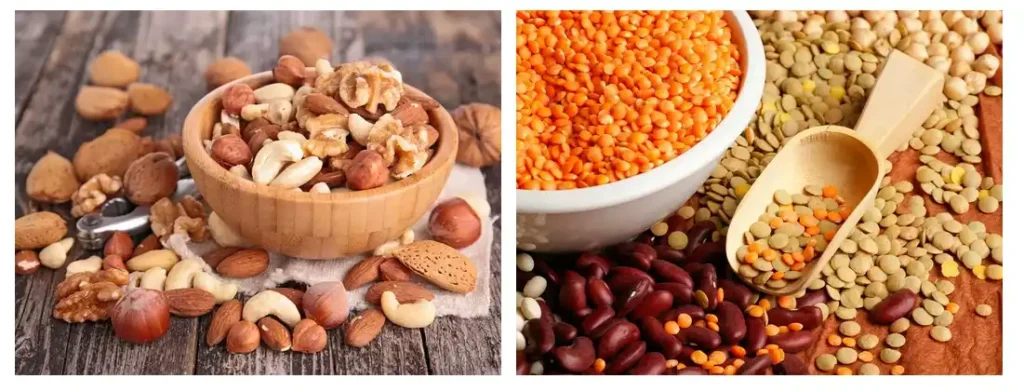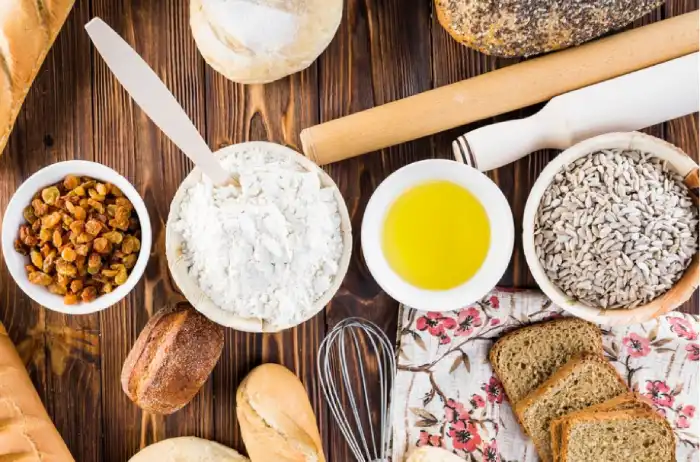
How important are supplements?
Dietary supplements are well suited to compensate for nutrient deficienities. Note, however, the easiest way is not always the most effective or healthiest!
Basic supplements
Generally speaking, due to our western eating habits, we consume too little of the following 4 nutrients. Tip: You are best to get a combination preparation that covers all basics !
Vitamin D
With the help of sunlight, your body produces vitamin D itself. It keeps your bones healthy and optimized/supports muscle and immune function.
Vitamin D makes you partly more powerful when exercising. However, an additional intake is usually only necessary in winter.
- Foods with vitamin D: cod liver, herring, salmon, sardine, avocado, porc mould, processed cheese, gouda, eggs, mushrooms.
- Daily requirement: 2-3x per week approx. 12 minutes of sunshine, depending on your skin type. You should always need to medically clarify a vitamin D deficiency.

Omega-3 fatty acids / fish oil
Let us usually take too little. Omega 3 has anti-inflammatory and antihypertensive. It makes you fitter and ensures better regeneration.
Your entire cardiovascular system is positively influenced by omega-3 fatty acids.
- Food with omega-3 fatty acids: mackerel, tuna, salmon, linseed or rapeseed oil, avocado, walnuts, almonds, chia seeds, algae.
- Daily requirement (free time): 2x per week fish or abundant source of omega-3. Supplementation is sometimes useful if you eat a vegetarian or vegan diet.
- Daily requirement (performance): Here a supplementation with approx. 2 g per day recommended.
Vitamin K2
Produced by bacteria in the intestines. It supports your vitamin D effect (synergistic) and clotment. Vitamin K2 also reduces artery calcifications and kidney stones.
- Food with vitamin K2: broccoli, cabbage, liver, green tea, oats, full wheat, potatoes, asparagus, butter, cheese.
- Daily requirement: 100-200 Ã…g per day (e.g. B. 70 g broccoli or 130 g hard cheese).
Jod and selenium
70% of all Germans have a defect here. These nutrients increase the thyroid hormone T3 for more energy in everyday life, better endurance during sports and faster weight loss.
- Food with iodine: fish, spinach, milk, iodized salt.
- Food with selenium: roast chicken, nuts, legumes, cabbage, currants, bananas.
- Daily requirement Iodine: 180-200 Ã…g per day (e.g. B. 150 g salmon, 1.5 l milk, 900 g spinach or 4 Brazil nuts).
- Daily requirement Selenium: 60-70 Ã g per day (e.g. B. 100 g of tuna, 100 g soybeans or 4 Brazil nuts).
Specific supplements
Many people have bepoed with the nutrients just mentioned. In addition, there are other occasional nutrient deficiencies.
Some occur with a very one-sided or unhealthy diet. Others are important for specific target groups.
Folic acid
Important for growth, cell division and blood formation. If you eat less vegetables (mainly green) you often need this supplement.
Pregnant women and women who want a child should also eat more folic acid.
- Food with folic acid: lettuce, spinach, tomatoes, asparagus, cabbage, soybeans (e.g. in the form of tofu), peas, wheat bran, whole grain products, egg yolk.
- Daily requirement : 300 Ã g per day (e.g. B. 200 g spinach or peas).
Iron
Provides your cells with energy and transport oxygen in your body and muscles. Iron is a trace element.
A good supplier is (red) meat, therefore vegetarians: women or vegans: often rely on such food supplements.
- Food with iron: (Red) meat, wheat bran, rice, pumpkin seeds, raisins, blueberries, soybeans, egg yolks, chickpeas, spinach.
- Daily requirement: 10-20 mg per day e.g. B. 300 g of beef or 450 g chickpeas).
Calcium
An important building block for your bones and teeth. Calcium transfers certain stimuli into your nerve cells. To do this, it is involved in the blood clotting and activates some enzymes and hormones in the body.
Young people, pregnant women and nursing women should take a little more.
- Food with calcium: dairy products, hard cheese, mozzarella, green vegetables, blueberries, broccoli, cabbage, spinach, parsley, natural mineral water.
- Daily requirement: 1,000-1,200 mg per day (e.g. B. 200 g yogurt or 250 g broccoli).

Vitamin B12
Decisive for DNA (the human genome), cell division, blood formation and all nerve functions. Humans cannot produce vitamin B12 (cobalamin) himself.
It is particularly important for children in growth. Vegans also: women have to resort to appropriate supplements, as they only occur in animal foods.
- Foods with vitamin B12: eggs, beef, minced, liver, oysters, trout, herring, Emmental, Camembert, yogurt.
- Daily requirement: 4 Ã…g per day (e.g. B. 10 g liver, 40 g herring or 100 g camembert).
Zinc
The multi-talent for your immune system. Important for skin and hair and healing wounds. Without zinc your metabolism does not work properly.
And also for various hormones, as well as producing sperm, the body relies on zinc. Pregnant, breastfeeding and competitive athletes: need a little more.
- Food with zinc: meat/fish, seafood, peas, liver, oatmeal, nuts, gouda, mixed wheat bread, sunflower seeds, wheat bran.
- Daily requirement: 7-16 mg per day (e.g. B. 100 g of veal liver, 50 g oysters or 200 g Brazil nuts).
Magnesium
A vital mineral. Magnesium is in your bones as well as in the skeletal muscles. It affects the heart muscle, your blood vessels and bronchi.
Magnesium also supports many enzyme systems. Teenagers and young adults sometimes do not reach the recommended supply.
- Foods with magnesium: whole grains, legumes, (dark) chocolate, marzipan, green vegetables, flaxseed, spinach, kohlrabi, bananas, raspberries.
- Daily requirement: 250-350 g per day (e.g. B. 6 bananas or 200 g of lentils).
BCAA amino acids
Behind the individual letters is an amino acid complex that supplies muscles and cells. Specifically, these are: leucine, isoleucine and valine.
Supplements often make sense for a vegan diet or with a lot of training.
- Food with BCAA: fish, eggs, milk products.
- Daily requirement: 10-20 g per day (e.g. B. 100 g of chicken breast or 100 g of tuna).

Which Supplements for Muscle Building & Strength sports?
In most cases, it is enough if you eat healthy to take the most important nutrients to you. If you cannot succattered for various reasons, we recommend the following 4 fitness supplements for muscle building and regeneration.
1. (Whey) protein powder
A low-fat protein supplier with high-quality protein, which can be used well by the body. Suitable for pre- and post-workout shakes. Comfortable, fast, tasty and cheap.
Especially when natural sources of protein do not meet your needs. The protein powder is available for shakes or in the form of protein tablets for muscle building.
- Dosage: approx. 30 g before and after exercising (usually noted on the product).
2. Creatine (monohydrate)
Allows you to perform in higher performance and builds more muscle mass in the long term. It acts is effective, safe and cheap. Take it best in the first few days along with carbohydrates – this improves picking up in the muscles.
- Dosage: approx. 5 g per day (usually noted on the product).
Tip: Creatine is often sold in combination supplements with L-glutamine. The semi-essential amino acid acts similarly to the muscle mass as creatine – but your body produces it yourself! If you take it in addition, go out most of the pee making it right away. Studies were able to demonstrate only minimal effects of glutamine supplements.
3. Beta-Alanine
Increases the carnosine content in your muscles. Similar to creatine, it allows you a strength training with higher intensity. The supplement builds strength and muscle over time.
- Dosage: approx. 2 g per day (usually noted on the product).
4. MSM – Methylsulfonylmethane
The supplement MSM is quite new. Basically, it is a sulfur compound that is supposed to have various medical effects.
Athletes: because it inhibits inflammation and protects bones and muscles. For example, test subjects had less muscle soreness by taking MSM.
- Dosage: Keep in the insights to the package details! In previous studies, depending on body weight, depending on body weight, has been tested.

Keep an eye on: Newcomer Astaxanthin?
Astaxanthin is a red dye that occurs in algae and fish or crabs that eat these algae. In the net, many recommend it as a miracle cernitis and for better recovery.
But: Until now, it is only proven that it supports the immune system after exercise, because certain proteins are less broken down.
Which supplements help with losing weight?
- Often you hear about miracle remedies such as diet pills or appetite co-smoking, which are said to help you lose weight. However, you often have unsightly side effects and are not healthy at all!
L-Carnitine: useful or not?
- Other additions, e.g. by the way, the hyped L-carnitine has no proven added value.
- Studies were unable to demonstrate neither stronger fat loss nor better performance. Your body usually produces enough carnitine yourself and you also take up sufficient amounts about eating. Even vegans: no need to worry, although carnitine is mainly found in animal products!
- However, there are also very simple and natural supplements that make sense when losing weight:
1. coffee
- Caffeine suppresses hunger and burns fat. However, you should only consume between 50-400mg per day. So, please do not have a caffeine powder (too highly dosed!). Better fastening slowly with high quality coffee or black tea.
2. Green tea
- It works mainly by containing catechin polyphenols. Green tea also contains caffeine and boosts fat burning. Dosage: 7-8 grams of matcha tea powder per day in liquid form (approx. 4-5 cups) or as an extract in tablets/capsules.
read also: Not just salt: The nutritionist named many foods that lower blood pressure